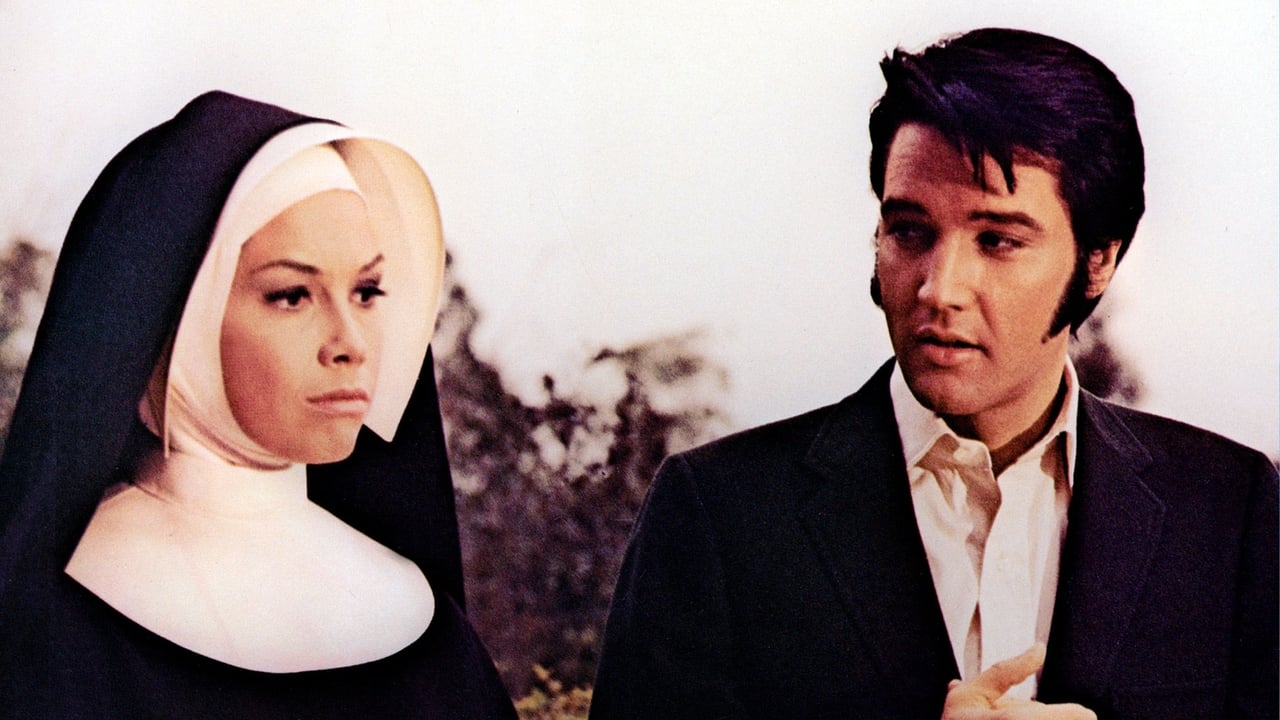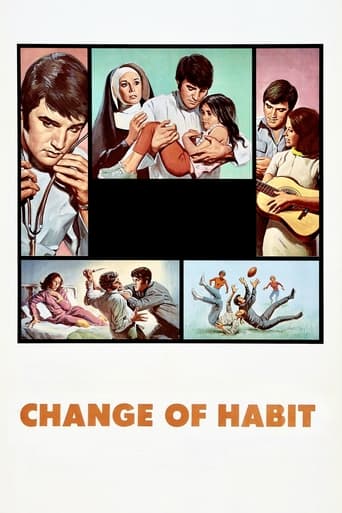

What better way to celebrate what would have been Elvis Presley's 82nd birthday than by enjoying his final film? It was an admirable end to his acting career and an appealing overture to THE MARY TYLER MOORE SHOW, boasting as it does both MTM and Ed Asner. It's as if the baton were being passed from the 1960s to the 1970s.Co-stars Mary Tyler Moore, Jane Elliot, and Barbara McNair were all good, with MTM really surprising me in a role far from Laura Petrie and Mary Richards. Jane Elliot was the breakout star for me, very impressive as the idealistic Barbara. Soon after this movie she was cast as Daphne in "The Guru" episode of THE MOD SQUAD where she actually played a Velma-like character who nonetheless steals the show. Barbara McNair was the weak link, never clicking with the others, partly because her character was dispatched to house calls. Her acting was wooden, her face a stone mask rarely brightened with a smile or any expression. I found forced and unconvincing her big scene announcing amnesty on debts to The Banker. Speaking of whom, Robert Emhardt, who played the kindly cook in Elvis' 1962 movie KID GALAHAD, was very effective as the neighborhood kingpin. More than just a loan shark, he implies to the naïve and oblivious Sister Barbara that she shouldn't be prostituting in his turf. It was a testimony to the film's commitment to harsh reality that The Banker, while bruised, isn't broken, and will be back shaking down the locals the next day.The film was unflinching in its portrayal of ghetto idleness (and how that is indeed the devil's workshop), fatherlessness and abandonment, exploitation, mental illness, and violence. The attempted rape scene, for example, was especially harrowing for a G-rated movie! And no easy solutions are offered, just a little light in the darkness provided by Carpenter and company. Also realistic and controversial was the film's portrayal of the Roman Catholic Church, caught between its past and its post-Vatican II future. I don't see the Church recommending this movie to boost vocations! Regis Toomey was very good in his thankless role of curmudgeonly Fr. Gibbons, an old school priest who simply locks the church's doors against the outside world. Sister Michelle's suggesting people-pleasing reforms like a folk mass seem innovative and idealistic, but almost fifty years later the erosion of tradition, politicization, and balkanization within the Church in the wake of Vatican II make her suggestions appear like an invitation to step out onto a slippery slope. Sister Barbara's peace signs and grocery store sit-in aptly reflect the real world agitation of rogue priests like the Berrigan Brothers.Another actor in a thankless, blink-and-you'll-miss-him role was Richard Carlson as Bishop Finley. A decade earlier Carlson was headlining feature films like THE CREATURE FROM THE BLACK LAGOON and starring in his own series, MACKENZIE'S RAIDERS. Now he was reduced to one measly scene. Fame is fleeting. And certainly Elvis knew this and perhaps he feared it would be his fate as well, since his screen time was reduced in both this film and its predecessor, THE TROUBLE WITH GIRLS.Some reviewers have challenged the believability of Tennessee-native Dr. John Carpenter coming to the ghetto of New York City to practice medicine in a free clinic. But Carpenter explains the reason to Michelle after the football game, saying he had a war buddy from Washington Street who saved his life and later died half a world away (presumably Vietnam). Carpenter felt it only right to dedicate a few years of his life to paying back a debt to his friend. I liked that reason, and I also liked the subtle religious symbolism implied by it. Carpenter isn't planning on serving there indefinitely, but--like that other Carpenter--would minister among the poor only for a season.What I challenge is the believability of the nuns taking a vow of silence not to reveal they are nuns while on this assignment, especially as it necessarily results in deception and dishonesty (and to his credit Carpenter calls out Michelle for that). It makes no sense except as an obvious plot device to set up the star-crossed romance and the big reveal at the end. And speaking of revealing, what was with the gratuitous and unseemly stripping scene near the beginning? That was a savory bone tossed to nun fetishists but a turn-off to anyone with any respect for the cloth. And why would these nuns on a short assignment order an upright piano for their apartment? Again, just to set up the jam session of "pagan music" with Elvis that outraged the distaff Statler and Waldorf leaning out of their windows to weigh in on the passing scene.Sisters Michelle, Barbara, and Irene were chosen for this experimental assignment, sent into the mixed-up world with the hope they wouldn't be mixed-up by that world. Since all three end up suffering some degree of confusion and crisis, I suspected they were selected for the assignment because they were determined to be at-risk for staying in the Church. And in the end one has quit and it's strongly implied Michelle will be leaving as well, with Mother Joseph's blessing (judging by her knowing smile when John comes to call at the convent). The closing scene says it all, with Michelle sitting in the folk mass looking from John to Jesus to... mother and child.This was a fine movie for Elvis to close out his acting career. He again showed his abundant abilities and evidenced enduring appeal. And the music was uniformly excellent, from the under-appreciated title song (an upbeat complement to "In the Ghetto") to "Have a Happy" (which atones for the treacly "Confidence" of CLAMBAKE), and on through the rousing closing number "Let Us Pray." Elvis went out on the proverbial high note.
... View MoreIt seems a shame that someone with such talent as Elvis Presley consistently got such garbage for scripts. This movie shows what was still there, what had been there all along, if the material had just been a little better.This movie recalls the gutsy performances given in Jailhouse Rock and King Creole.A stronger support cast doesn't hurt either, and all the players seem equally committed to doing the film justice.Perfect, no.But overall, this is a very watchable movie, and testament to the talent that Elvis had.
... View More1969 was more than a change of habit but a change of direction for Elvis. Years of formula musicals drained all the interest & passion Elvis had early on. Charro is a decent western showing Elvis the actor but Change Of Habit is a religious drama, social commentary & a musical, the combination doesn't work. It's a good serious attempt but the songs get in the way & don't fit. Elvis never really sinks his teeth & gets deep into his role & he just skims & glides on the surface. Not for a moment is he convincing as a doctor who has to break into a song because he's Elvis Presley.....what a coincidence. It's a movie that should've never been made. For his last 2 films Charro is the quality movie.
... View MoreThis movie is dated in a lot of ways, and not so dated in others. The fact that it was made at the end of the 60's comes out not only in the topics, but the way the movie was made, using modern (for the time--but maybe outdated for movies now) sets, filming techniques, and even story lines. Still, we see here that Elvis was an outstanding actor. It was not hard to think he was anything other than the character he played in this movie. I also have to add that he looks extremely cool in this movie!The part that really shines in this movie is the last 20 minutes. The complicated love between Elvis' and Mary Tyler Moore's characters is NOT outdated at all. This part of the movie is played out really well. On top of this, finding out the destinies of the other sisters will leave us as viewers with a lasting impression.
... View More